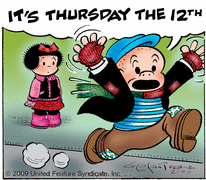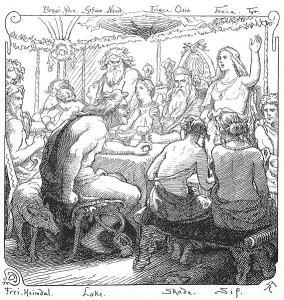Friday the 13th is upon us once again. What better way to celebrate the unluckiest day of the year than by looking at why the number 13 so concerns those of us from the Western world? In fact, the origin of 13 as an unlucky number is just as ancient and murky as our understanding of why Friday the 13th is a day of superstition among Anglo-American culture. While theories abound, one of the more interesting explanations suggests that 13 holds such weight in western culture simply because it is one more than 12.
At first glance this line of logic may not make much sense, but whether or not you believe it, 12 does hold a great deal of value, particularly to Western culture, but also to various other cultures throughout the globe. One researcher argues that its significance may stem from the imprecision of the 12-month lunar calendar by which many cultures measure time:
many traditions used both lunar and solar reckoning in their calendars, and this is instantly problematic, as the reckoning produces that there are more than twelve, but less than thirteen divisions of the year (roughly 12.41 lunations per solar year).
This cultural significance of “more than twelve” can also be traced to both Scandinavian and Judeo-Christian sources. The ancient Norse pantheon consisted of 13 true gods, including Odin, their leader; thus Scandinavian war companies traditionally comprise a group of 12 plus one leader. Likewise, you may also recognize
the 12 apostles of the New Testament in modern Christian culture. In fact, some scholars have connected the last supper, in which Jesus was notoriously betrayed by Judas, to the age-old superstition that when 13 people sit down to dine, inevitably one of them will die soon thereafter. However, this tradition is nowhere near as new as that of the Norse god Loki, from Loki’s Quarrel, who while unwelcome joins a dinner party for 12 gods, which then leads to the death of the god Baldr and to the first in the chain of events that lead to Ragnarok and the destruction of the world.
In recent times, some noteworthy figures in Anglo-American culture have reclaimed the number 13 as an omen of luck. This was true for the famous wife of the inventor of the Winchester rifle, Sarah Winchester, who was a renowned spiritualist and a local legend. After the death of her husband and until her own death, she continuously renovated her 162 acre property in fear of being haunted by the spirits of everyone shot and killed by a Winchester gun. The motif of 13 plays a key role in warding off malevolent spirits, and throughout the house you can find daisies with 13 petals, chandeliers with 13 candlesticks, priceless stained glass windows inlaid with 13 colored stones, and more.
More of you may be familiar with the pop singer Taylor Swift, who will be celebrating her 24th birthday tomorrow. In an interview she has also attributed many of her successes to the number 13:
“My first album went gold in 13 weeks. My first #1 song had a 13-second intro. Every time I’ve won an award I’ve been seated in the 13th seat, the 13th row, the 13th section or row M, which is the 13th letter.”
Whether or not you believe in the superstition yourself, the history of the number 13 is both ancient and interesting. Can you say that this curious number has had an impact on your life as well?
Related Sevenponds articles:
- It’s Friday the 13th! Again…
- How Ancient Nordic Viking Funeral Burials Reflect Common World Traditions
- Art and the Death Penalty

 Unlucky Number Thirteen
Unlucky Number Thirteen




 Forest Bathing Eases Grief by Soaking in Nature
Forest Bathing Eases Grief by Soaking in Nature

 Meaning-Focused Grief Therapy: Imaginal Dialogues with the Deceased
Meaning-Focused Grief Therapy: Imaginal Dialogues with the Deceased














